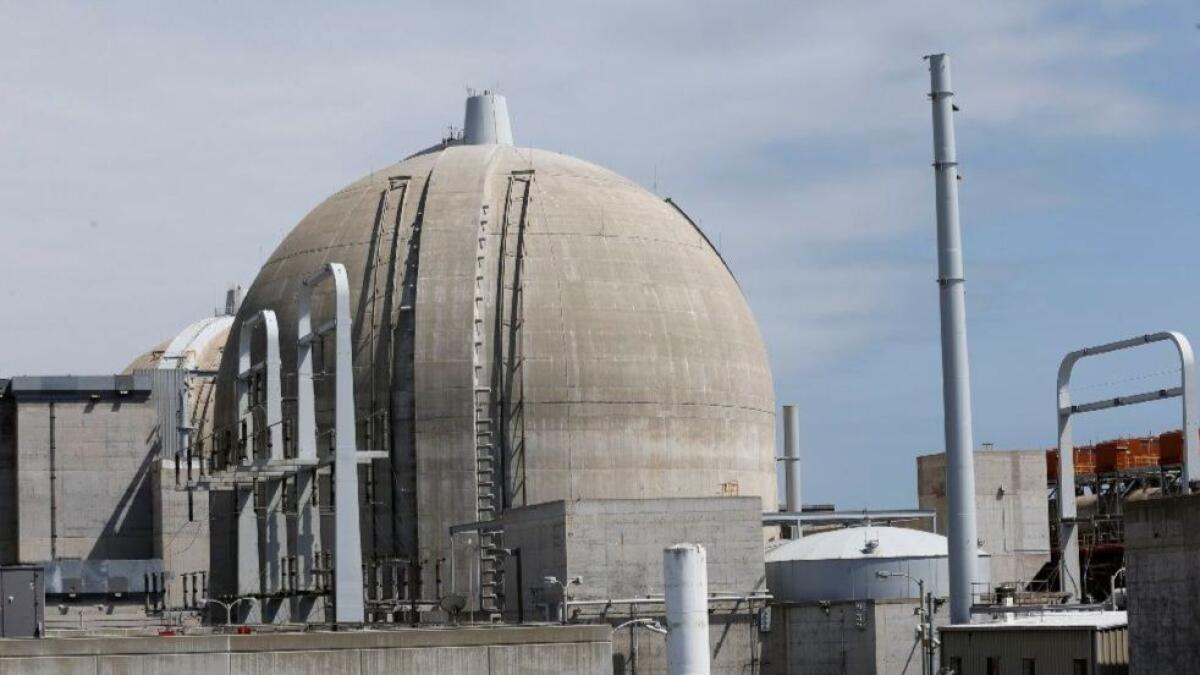PUC judge gives approval to proposed San Onofre settlement

- Share via
Five months after owners of the failed San Onofre nuclear plant agreed to slice hundreds of millions of dollars from the cost to ratepayers of the 2012 breakdown, a California Public Utilities Commission judge has endorsed the proposed settlement.
If the full commission also approves the decision, customers of Southern California Edison and San Diego Gas & Electric will save $775 million from their share of the $4.7 billion in closure costs.
The decision from commission Judge Darcie Houck is dated June 22 but was just released Monday afternoon.
Without commission approval, the legal settlement of a federal lawsuit challenging the 2014 plan that charged utility customers 70 percent of the nearly $5 billion in closure costs has languished. The ruling from Judge Houck makes it more likely customers will save money from the previous arrangement.
“The 2018 settlement agreement, as modified, resolves the commission’s investigation into the rates, operations, practices, services and facilities of Southern California Edison Co. and San Diego Gas & Electric Co. associated with the San Onofre Nuclear Generating Station Units 2 and 3,” the judge wrote.
The only amendment imposed by the judge regards $25 million that was supposed to be paid by the utilities to study the effects of greenhouse gas emissions.
That payment was first negotiated at a secret meeting in Warsaw, Poland between former commission president Michael Peevey and an Edison executive, according to records previously disclosed in the commission investigation.
The specific deal point became part of a criminal investigation into the utilities commission conducted by the state Attorney General’s Office.
Commission spokeswoman Terrie Prosper did not immediately respond Monday to a request for comment.
Attorney Maria Severson, who sued Edison and the utilities commission in federal court to try and overturn the initial San Onofre deal, praised the ruling.
“It is great news for ratepayers,” she said in a telephone interview. “By doing this, the ratepayers will avoid paying the last five years of what they were charged under the original settlement agreement.”
Severson and her law partner, former San Diego city attorney Michael Aguirre, lost their case before a U.S. District Court judge in 2015. But more than a year later the Ninth U.S. Circuit Court of Appeals agreed to hear the case.
The decision by federal appeals judges prompted attorneys for Edison and SDG&E to open settlement negotiations, and early this year all parties to the case announced the agreement to stop charging utility customers for many of the closure costs after December 2017.
The deal was calculated to trim $775 million or more from the residential and commercial utility bills through 2022.
For 6.4 million customers across Southern California, the savings will total $121 on average over four years.
Even so, the agreement has yet to be approved by the utilities commission, so ratepayers have continued to pay for the broken power plan despite the deal announced in January.
The five commissioners are expected to consider the judge’s proposed decision later this year. If approved, ratepayers would collect a refund equal to costs paid between December and whenever the approval is formally adopted.
The status of the state criminal investigation is not clear. The Attorney General’s Office executed at least six separate search warrants, but no charges have ever been filed.
More to Read
Sign up for Essential California
The most important California stories and recommendations in your inbox every morning.
You may occasionally receive promotional content from the Los Angeles Times.













